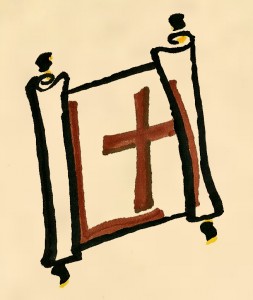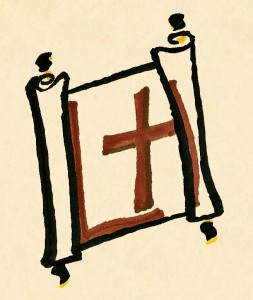Bible Brutality
Historians credit the Bible with achieving gains in human rights and civil equality…
When you start studying other cultures of Biblical times, you have to admit that the Bible looks remarkably civilized. But does this make the apparent brutality in the Bible right? Is Yahweh really a just God? Is there reason to believe that the God of the Bible exists, and that He is not just some figment of power-hungry patriarchs’ imaginations?
COMMON MISCONCEPTIONS
First we must examine some elementary misconceptions about the Bible that skeptics mistake for genuine criticism.
“Young children were stoned to death for disobedience in the Old Testament!”
Incorrect. The Torah only commands that wayward, unrepentant accountable adults who dishonored their parents be stoned (Deuteronomy 21:18-23). Notice that this was only allowed to happen if the son had already been chastised and still refused to come around.
“But the Bible says slavery is okay!”
Not exactly. The Torah outlaws the slave trade in Exodus 21:16 and Leviticus 25:42. In fact, a slave trader was to be put to death. Furthermore, our concept of slavery today is different from what it was in the days of the Old and New Testaments. When we hear the term “slavery” in the 21st century, we usually think of child labor, sex trafficking and the race-based slavery that occurred in the past few centuries. But in Biblical times, slavery was not race or gender based.
In the warrior culture of the Old Testament era (roughly 4000 to 415 B.C.), slavery was associated with prisoners of war, paying off debts, and apprenticeship. By the time of Christ’s First Coming and the Early Church, slavery was a fundamental part of the Roman economy. It was not uncommon for professional people like doctors and lawyers to become slaves to the very wealthy for the sake of financial stability.
The equality of the entire human race is a teaching that sets the Bible apart from other ancient laws and literature. Foreigners and those who were in the slave division of the working class were given equal treatment under the Law with the rest of Israelite society and were not allowed to be brutalized or treated like mere property (Exodus 20:10, Exodus 21:26-27).
There were also statutes for the protection of working women. Slave girls were not permitted to “go out” into dangerous areas and do work that was more suitable for men (Exodus 21:7).
“If you believe everything in the Bible, then you have to believe in gruesome death penalties and a vicious, genocidal God.”
Incorrect. Why was sin dealt with so harshly in the Old Testament? The reason is because the nation of Israel was charged with the responsibility and privilege of bringing the Savior of all mankind into the world. Satan’s attempt to thwart Yahweh’s plan of salvation involved attempts at wiping out Israel and damaging Christ’s lineage through various physical and spiritual problems.
Sin is, essentially, treason against Yahweh that places a person within the domain of Satan. The Law (or Torah) was the special code that if kept properly would prevent Satan from having any legal right to interfere with the Israelites. The civil penalties of death and animal sacrifice also serve as shocking illustrations of how bad sin really is, and what punishment sinners deserve but are now spared from.
Since the First Coming of Jesus Christ (Yeshua Messiah), many detailed civil law aspects of the Torah are no longer performed, arguably because 1) Jesus’ one-time sacrifice is perpetually fulfilling every sacrifice that is being required through the Law’s existence (Matthew 5:17-18), and 2) therefore, when Jesus returns, He will not be born into a sacred tribe again. Thus, the particular strategic phase of spiritual warfare that took place in the Old Testament is over. A new phase is in place now.
A poignant example of Jesus superseding civil applications of the pre-Messianic strategy occurs in John 8.
The scribes and the Pharisees brought a woman caught in adultery, and having set her in the center of the court, they said to Him, “Teacher, this woman has been caught in adultery, in the very act. Now, in the Law Moses commanded us to stone such women; what then do You say?”
They were saying this, testing Him, so that they might have grounds for accusing Him. But Jesus stooped down and with His finger wrote on the ground. But when they persisted in asking Him, He straightened up, and said to them, “He who is without sin among you, let him be the first to throw a stone at her.”
Again He stooped down and wrote on the ground. When they heard it, they began to go out one by one, beginning with the older ones, and He was left alone, and the woman, where she was, in the center of the court. Straightening up, Jesus said to her, “Woman, where are they? Did no one condemn you?”
She said, “No one, Lord.” And Jesus said, “I do not condemn you, either. Go. From now on sin no more.” (NASB)
– John 8:3-11
Jesus clearly insists that His followers are to abstain from sin for their own protection from the spiritual enemy. But Jesus revoked the requirement of blood payments for our sins because such payments are superfluous. His perfect blood sacrifice continues to pay off the ultimate debt for every human generation.
Another example of this occurs in Mark 2, regarding punishment for working on the Sabbath.
And it happened that He was passing through the grainfields on the Sabbath, and His disciples began to make their way along while picking the heads of grain. The Pharisees were saying to Him, “Look, why are they doing what is not lawful on the Sabbath?”
And He said to them, “Have you never read what David did when he was in need and he and his companions became hungry; how he entered the house of God in the time of Abiathar the high priest, and ate the consecrated bread, which is not lawful for anyone to eat except the priests, and he also gave it to those who were with him?”
Jesus said to them, “The Sabbath was made for man, and not man for the Sabbath. So the Son of Man is Lord even of the Sabbath.” (NASB)
– Mark 2:23-28
[DEVELOPING…]
 You've arrived at Luke Historians, an accredited review and primary source rooted fact-checking service and database on a mission to enhance media credibility.
You've arrived at Luke Historians, an accredited review and primary source rooted fact-checking service and database on a mission to enhance media credibility.




No Comments to “Bible Brutality”